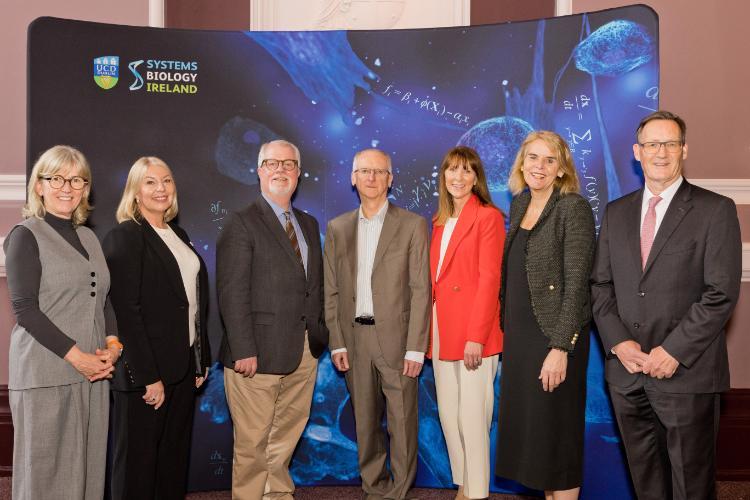MAGIC-I: A New Era in Paediatric Oncology
Research Spotlight
April 2025

(L-R) Prof Mary Horgan, Chief Medical Officer, Department of Health; Noreen Doyle, Patient Advocate; Prof Owen Smith, Professor of Child, Adolescent and Young Adult Oncology, Trinity College Dublin, and Principal Investigator on MAGIC-I; Prof Walter Kolch, Director of Systems Biology Ireland, UCD, and Principal Investigator on MAGIC-I; Triona McCormack, Vice-President for Strategy and External Engagement, UCD; Prof Susa Bensler, Chief Academic Officer, Children’s Health Ireland; Prof Risteard O'Laoide, Director, National Cancer Control Programme
The launch of MAGIC-I (Molecular and Genomic Interrogation of Childhood Cancer – Ireland) on the 23rd April 2025 in the Royal College of Physicians of Ireland marked a milestone in Irish paediatric oncology. As Ireland’s first clinical study dedicated to integrating genomics into routine cancer care for children and adolescents, MAGIC-I represents a bold leap into personalised medicine, blending advances in research and technology development with clinical impact.
MAGIC-I is a five-year nationwide study that aims to embed genomic sequencing into the care pathway for every child and adolescent diagnosed with cancer in Ireland. With a strong research framework at its core, MAGIC-I leverages whole genome sequencing (WGS), RNA sequencing (RNAseq), and cutting-edge data analytics to build a deep molecular profile of each patient’s cancer. This approach not only supports more accurate diagnosis and prognosis but also enables highly individualised treatment planning.
Co-led by Systems Biology Ireland (SBI) at University College Dublin (UCD) and (opens in a new window)Children’s Health Ireland (CHI), in collaboration with (opens in a new window)Precision Oncology Ireland, and global industry partners such as Illumina, the study introduces a robust digital infrastructure for high-throughput genomic analysis. One of its most innovative elements is the development and use of Digital Twins - virtual models of patients created using genomic, clinical, and molecular data. These simulations allow researchers and clinicians to trial different therapies computationally before administering them in real life, offering a powerful tool to predict treatment outcomes and side effects with unprecedented precision.
Industry partners (opens in a new window)Illumina and (opens in a new window)GenSeq play critical roles in enabling the framework behind MAGIC-I. Illumina is providing the MAGIC-I team sequencing reagents and access to their proprietary DRAGEN™ software platform for next-generation sequencing data analysis. DRAGEN enables rapid, highly accurate genomic data analysis, making it possible to convert raw DNA reads into actionable insights within clinical timeframes. GenSeq is tasked with performing the sequencing itself offering these services at a discounted rate, significantly enhancing the study’s cost-effectiveness while helping to build Ireland’s domestic genomic infrastructure. Importantly, there will be no commercial use of the patient data generated. All genomic data will be used solely for research and clinical purposes, with provisions for consent-based sharing through secure European Union data archives such as the Genome Phenome Archive. The MAGIC-I team will work closely with GDI Ireland and the 1+ Million Genomes initiative in terms of exchanging knowledge and best practices in terms of managing data.
Professor Walter Kolch, Director of SBI and a leading investigator in the study, describes MAGIC-I as “a trailblazer in the seamless amalgamation of clinical research with advanced computational modelling.” The project not only supports clinical decision-making but also functions as a proof-of-concept for these digital twin technologies in paediatric oncology, a domain where personalised approaches are particularly vital.
Clinically, the impact of MAGIC-I could be profound. Professor Owen Smith, Principal Investigator at SBI and Consultant Paediatric Haematologist at CHI Crumlin, emphasises how genomics can illuminate why certain patients relapse or experience severe toxicities. By mapping the genomic landscape of each cancer, MAGIC-I enables clinicians to tailor therapies that are both more effective and less harmful. This level of precision may also unlock new drug targets and alternative treatment strategies, potentially replacing genotoxic therapies that carry long-term side effects.
In addition to its immediate clinical benefits, MAGIC-I is aligned with Ireland’s broader vision for genetic medicine, as laid out in the (opens in a new window)HSE’s National Strategy for Accelerating Genetic and Genomic Medicine.

Read more about SBI researchers' ground breaking work in our series of "Spotlight" articles